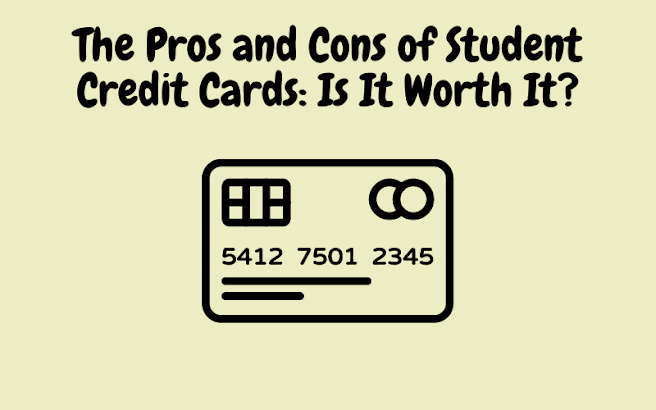The Pros and Cons of Student Credit Cards: Is It Worth It?
Student credit cards are often touted as a valuable tool for young adults to establish a credit history and learn financial responsibility. These specialized credit cards cater to students with limited or no credit history, offering a range of benefits specifically designed to meet their needs. While student credit cards can provide a host of advantages, they also come with potential drawbacks that warrant careful consideration. This article will delve into the pros and cons of student credit cards, enabling students and their parents to make an informed decision about whether these cards are truly worth it in the pursuit of financial independence and building a solid credit foundation.

Pros and cons of student credit cards in detail:
Pros of Student Credit Cards:
Building Credit History: One of the main benefits of student credit cards is the opportunity to start building a credit history. By using a credit card responsibly and making timely payments, students can establish a positive credit record, which can be beneficial when applying for future loans, renting an apartment, or even securing a job.
Financial Education: Student credit cards can serve as a valuable tool for financial education. They provide an opportunity for young adults to learn about responsible spending, budgeting, and managing credit. By actively monitoring their credit card activity and making informed decisions, students can develop valuable financial literacy skills that will benefit them in the long run.
Rewards and Perks: Many student credit cards offer rewards programs tailored to student needs. These rewards can include cashback on purchases, discounts on textbooks or school supplies, or even points that can be redeemed for travel or other desirable rewards. Taking advantage of these perks can help students save money or enjoy additional benefits.
Emergency Fund: Student credit cards can provide a safety net in case of emergencies. If unexpected expenses arise, having a credit card can provide a temporary solution while avoiding financial stress. It can be a helpful tool for covering emergency expenses when other options may not be readily available.
Cons of Student Credit Cards:
High Interest Rates: Student credit cards often come with higher interest rates compared to other types of credit cards. If the balance is not paid in full each month, the accruing interest can quickly accumulate and lead to significant debt. Students should be cautious about carrying a balance on their credit cards and understand the potential long-term costs associated with high interest rates.
Accumulating Debt: Without responsible financial management, student credit cards can lead to excessive debt. It can be easy for students to overspend and find themselves with a substantial credit card balance that becomes difficult to repay. It is crucial to use credit cards responsibly and avoid accumulating debt beyond what can be comfortably repaid.
Temptation to Overspend: Student credit cards can be enticing, leading some students to overspend beyond their means. Having access to credit may create a false sense of financial security, resulting in impulsive purchases or unnecessary expenses. It is essential for students to develop disciplined spending habits and create a budget to avoid falling into this trap.
Potential for Damaged Credit: Irresponsible use of student credit cards, such as making late payments or maxing out the credit limit, can have a negative impact on credit scores. A damaged credit history can hinder future financial opportunities, including obtaining loans or securing favorable interest rates. Students must understand the consequences of mismanaging their credit cards and strive to maintain a good credit standing.
Bottom line:
In conclusion, student credit cards can be a valuable financial tool for young adults, but they come with both pros and cons that should be weighed carefully. The advantages include the opportunity to establish credit history early on, gain financial literacy skills, and enjoy various perks and rewards. However, the potential pitfalls of student credit cards include high interest rates, the risk of accumulating debt, and the potential for irresponsible spending. It is crucial for students and their parents to consider their financial discipline, budgeting abilities, and long-term goals before deciding if a student credit card is worth it. Ultimately, responsible usage and careful monitoring of spending habits can help students make the most of these cards while avoiding unnecessary debt and financial setbacks.


Comments
Post a Comment